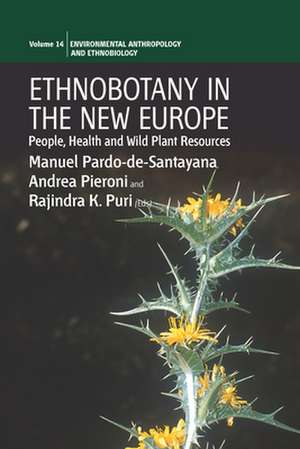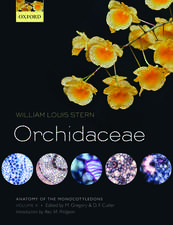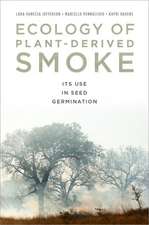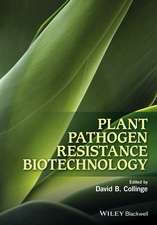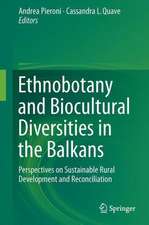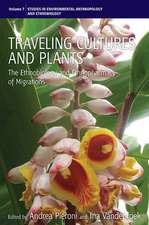Ethnobotany in the New Europe: Studies in Environmental Anthropology and Ethnobiology
Editat de Manuel Pardo-De-Santayana, Andrea Pieroni, Rajindra K. Purien Limba Engleză Hardback – 10 iun 2010
| Toate formatele și edițiile | Preț | Express |
|---|---|---|
| Paperback (1) | 303.11 lei 43-57 zile | |
| BERGHAHN BOOKS INC – 31 ian 2013 | 303.11 lei 43-57 zile | |
| Hardback (1) | 838.12 lei 43-57 zile | |
| BERGHAHN BOOKS INC – 10 iun 2010 | 838.12 lei 43-57 zile |
Din seria Studies in Environmental Anthropology and Ethnobiology
- 23%
 Preț: 752.00 lei
Preț: 752.00 lei - 23%
 Preț: 748.72 lei
Preț: 748.72 lei -
 Preț: 258.88 lei
Preț: 258.88 lei - 23%
 Preț: 749.02 lei
Preț: 749.02 lei - 23%
 Preț: 751.54 lei
Preț: 751.54 lei - 23%
 Preț: 751.54 lei
Preț: 751.54 lei -
 Preț: 263.68 lei
Preț: 263.68 lei -
 Preț: 257.13 lei
Preț: 257.13 lei -
 Preț: 262.14 lei
Preț: 262.14 lei - 23%
 Preț: 748.57 lei
Preț: 748.57 lei -
 Preț: 261.38 lei
Preț: 261.38 lei -
 Preț: 260.57 lei
Preț: 260.57 lei -
 Preț: 260.41 lei
Preț: 260.41 lei - 23%
 Preț: 744.59 lei
Preț: 744.59 lei - 23%
 Preț: 807.44 lei
Preț: 807.44 lei -
 Preț: 257.13 lei
Preț: 257.13 lei - 23%
 Preț: 748.44 lei
Preț: 748.44 lei
Preț: 838.12 lei
Preț vechi: 1088.47 lei
-23% Nou
Puncte Express: 1257
Preț estimativ în valută:
160.38€ • 167.87$ • 133.48£
160.38€ • 167.87$ • 133.48£
Carte tipărită la comandă
Livrare economică 31 martie-14 aprilie
Preluare comenzi: 021 569.72.76
Specificații
ISBN-13: 9781845454562
ISBN-10: 1845454561
Pagini: 408
Dimensiuni: 156 x 234 x 24 mm
Greutate: 0.75 kg
Ediția:New.
Editura: BERGHAHN BOOKS INC
Seria Studies in Environmental Anthropology and Ethnobiology
ISBN-10: 1845454561
Pagini: 408
Dimensiuni: 156 x 234 x 24 mm
Greutate: 0.75 kg
Ediția:New.
Editura: BERGHAHN BOOKS INC
Seria Studies in Environmental Anthropology and Ethnobiology
Notă biografică
Manuel Pardo-de-Santayana is an Assistant Professor of Botany at the Universidad Autonoma of Madrid. He has been researching contemporary and historical uses of Spanish medicinal and wild food plants, homegardens, and folk botanical taxonomies at the Royal Botanical Garden of Madrid (CSIC) and the School of Pharmacy (University of London) since 1995. Andrea Pieroni holds a PhD from the University of Bonn, Germany. He is an Associate Professor of Plant Biology and Ethnobotany at the University of Gastronomic Sciences in Pollenzo/Bra, Northern Italy and Editor-in-Chief of the Journal of Ethnobiology and Ethnomedicine. His research focuses on gastronomic and medical ethnobotany in the Mediterranean and in the Balkan areas, as well as among migrant communities and diasporas in Europe. Rajindra K. Puri is a Senior Lecturer in environmental anthropology and ethnobiology at the University of Kent at Canterbury, UK. With Christian Vogl he co-organizes a summer field school for methods in ethnobotany in the Austrian Alps and works with the Global Diversity Foundation in Morocco, Malaysia, and Namibia.
Cuprins
Acknowledgements Chapter 1. The Biocultural Dynamism of Europe, Past and Present Manuel Pardo-de-Santayana, Andrea Pieroni and Rajindra K. Puri Chapter 2. People and Plants in LA"pushA". Traditional Medicine, Local Foods, and Post-Communism in a Northern Albanian Village Andrea Pieroni Chapter 3. The Cultural Significance of Wild Gathered Plant Species in Kartitsch (Eastern Tyrol, Austria) and the Influence of Socio-Economic Changes on Local Gathering Practices Anja Christanell, Brigitte Vogl-Lukasser, Christian R. Vogl and Marianne Gutler Chapter 4. The Botanical Identity and Cultural Significance of Lithuanian Jovaras - an Ethnobotanical Riddle Daiva AeeA'kauskaite and Bernd Gliwa Chapter 5. Plants as Symbols in Scotland Today Veerle van den Eynden Chapter 6. Norway's Rosmarin (Rhododendron tomentosum) in past and present tradition TorbjA rn Alm and Marianne Iversen Chapter 7. A Preliminary Study of the Plant Knowledge and Grassland Management Practices of English Livestock Farmers, with Implications for Grassland Conservation Jenny McCune Chapter 8. The Use of Wild Edible Plants in the Graecanic Area in Calabria, Southern Italy Sabine Nebel and Michael Heinrich Chapter 9. The Ecology and Use of Edible Thistles in Aevora, Alentejo, Southeastern Portugal Maria Jose Barao and Alexandra Soveral Dias Chapter 10. Spring is Coming: the Gathering and Consumption of Wild Vegetables in Spain Javier Tardio Chapter 11. Persistence of Wild Food and Wild Medicinal Plant Knowledge in a North-Eastern Region of Portugal Ana Maria Carvalho and Ramon Morales Chapter 12. Chamomiles in Spain: the Dynamics of Plant Nomenclature Manuel Pardo-de-Santayana and Ramon Morales Chapter 13. Local Innovations to Folk Medical Conditions: Two Major Phytotherapeutic Treatments from the Maltese Islands Timothy J. Tabone Notes on Contributors Bibliography Index
Recenzii
"The text itself is useful, entertaining, and informative. In addition, each chapter is a model for modern ethnobotanical studies. Rather than simply cataloguingplant use, each researcher analyzes the historical, societal, economic, or political aspects relevant to changes in human plant usage. Thus, the authors provide a true ethnobotanical resource that can be instructive to academic audiences" * Choice "The merit of the book is that it offers a glimpse in the cultural diversity of Europe as a reflection of its history and shows some of the trends in both local ecological knowledge and ethnobotanical research in the old continent - I recommend this book to any scholar interested in doing ethnobotanical research in Europe and to any student that wants to carry out ethnobotanical research in Europe." * Economic Botany
